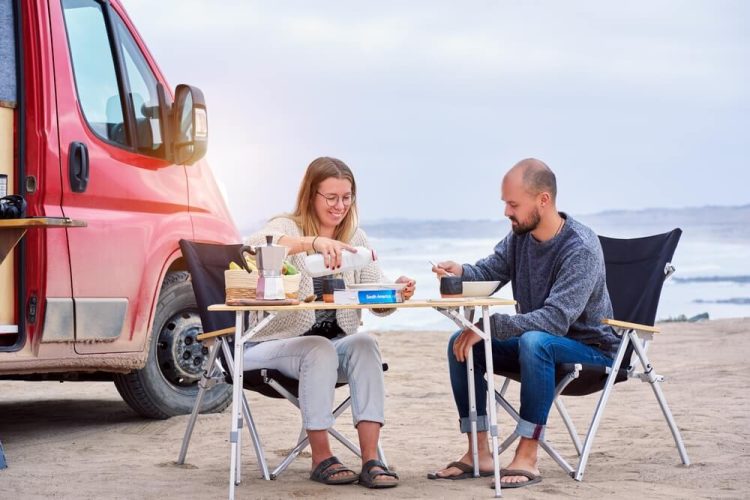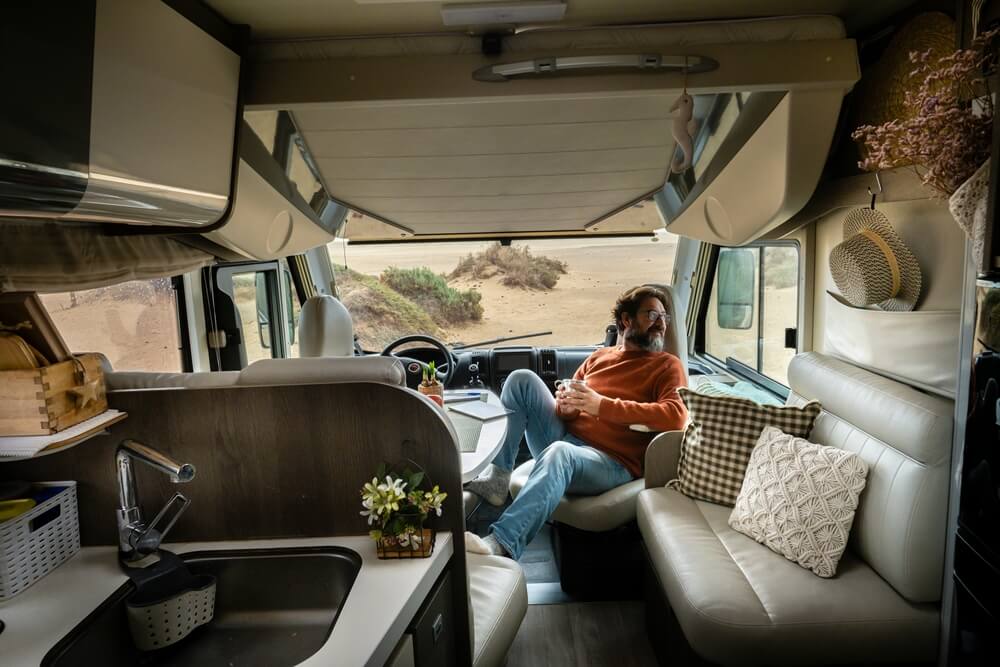
Are you an adventure lover who likes to take your home everywhere? If your map is dotted with trailheads, beach pullouts, and small-town coffee stops, you’re already living the dream—bed in the back, tools in the drawer, co-pilot snoring on the passenger seat. Before you pull away, the right RV and motorhome insurance keeps a cracked windshield, a surprise storm, or a parking-lot bump from turning into a route-ending detour.
This guide will be as practical and laid-back as you. You’ll find down-to-earth van insurance tips for weekend campers and full-time nomads alike – covering van life insurance, camper van insurance, full-time van insurance, and the kind of road trip protection that keeps a bad hour from becoming a ruined week. Ready? Let’s hit the road with peace of mind.
Understanding the Basics of Van Life Insurance
No two vans or routes look the same. This section lays a simple foundation so your coverage keeps up with your miles, your gear, and your pace. Keep in mind that if you live full-time in your van, you’ll need extra protection because it’s more than a vehicle—it’s your home on wheels.
What Van Life Insurance Covers
A solid camper van coverage setup usually blends:
- Liability for injuries or damage you cause to others—another vehicle, a campsite fixture, or a building.
- Collision for crash damage to your own rig, whether you nudge a post at a fuel stop or get tapped at a light.
- Comprehensive coverage for non-crash surprises: hail, theft, vandalism, fire, lightning, falling branches, animal strikes.
- Medical payments/PIP for you and passengers (state rules vary).
- Uninsured/underinsured motorist if the other driver can’t pay.
You might also consider optional coverages like roadside assistance designed for vans and RV chassis—towing, jump-starts, lockouts, and tire changes. If your build includes solar, cabinetry, a platform bed, a roof fan, a lithium battery system, or upgraded wiring, have your local insurance agent schedule those upgrades on your policy so their value is protected. A good place to start is understanding why standard RV insurance coverage matters.
Key Terms to Know Before You Buy
Looking for essential coverage tips? In addition to getting familiar with RV and motorhome insurance FAQs, here are some terms you should know to find the right policy for you and your motorhome.
- Actual Cash Value (ACV) vs. Agreed Value: ACV pays a depreciated amount at claim time; agreed value pays the number you and the insurer set up front (popular for new builds and high-end conversions).
- Full-time van insurance: Adds residence-style protection when the van is your primary home (higher personal-property limits, emergency expense, sometimes personal liability at campsites).
- Lay-up/storage period: Potential premium break when the van sits parked and off the road (policy- and region-specific).
- Personal effects: Coverage for the items you live and work with—laptops, cameras, tools—usually with per-item and total caps.
- Commercial use: If the van supports paid work (deliveries, mobile services, sponsored shoots), you may need endorsements or a commercial van policy.
Note: Mobile home insurance generally applies to stationary manufactured homes. Van lifers typically need van life insurance or RV insurance designed for driving, camping, and move-often living.
Essential Coverage Options for Van Owners
Good coverage should fit the way you travel, not the other way around. Use this section to shape a setup that makes sense for your rig and your budget.
Liability and Collision Protection
Think of liability as “protect others” and collision as “fix my van after a crash.” Here’s how that plays out on the road: if you back into a campsite water spigot and crack the pipe, liability covers the damage you caused; if a delivery truck clips your rear quarter, collision pays to repair doors and paint (minus your deductible).
Collision insurance also applies when a tight turn crunches a rear door or if your custom cabinet and bodywork is damaged in a covered event, so the interior fix is smoother.
For road trip protection, always have a proven travel checklist and consider higher liability limits like 100/300/100 (or more) to give yourself more financial breathing room than state minimums.

Comprehensive Coverage for Theft and Weather Damage
The road throws plenty of non-crash curveballs.
Common wins for comprehensive:
- Theft: A portable power station disappears, or a catalytic converter is cut overnight.
- Hail/wind: A high-plains squall dimples the hood and shatters a roof vent.
- Fire/smoke: A stove mishap or wildfire embers scorch paint and seals.
- Lightning: Electronics—from DC chargers to navigation gear—get fried.
If you chase coastlines or storms, ask about named-storm deductibles, hurricane haul-out, and emergency expense (lodging/food) after a covered loss.
Coverage for Personal Belongings
Your home rolls with you, so protect the things that make it work:
- Cameras, laptops, lenses, drones, hard drives.
- E-bikes or folders stored inside; recovery tools and compressor.
- Kitchen kit, power stations, portable fridge, camp systems.
Coverage often includes per-item caps. Keep photos, serials, and receipts in the cloud so claims move quickly.
Common Risks That Could Leave Van Lifers Stranded
Life on wheels is unforgettable—and unpredictable. A quick reality check now prevents long detours later.
Accidents and Road Hazards
Miles bring potholes, blowouts, gravel stretches, low branches, and tight fuel islands—so plan as if they’re on the itinerary. If you wander onto forest roads, confirm how your policy treats unpaved routes so a claim doesn’t stall on a technicality.
Gear-wise, all-terrain tires, a plug kit, and a solid jack won’t change your premium, but they change outcomes—turning a trip-ending flat into a brief pause.
Theft and Vandalism on the Road
Trailheads, downtown overnights, and festival lots draw crowds—and opportunities. Use visible deterrents like motion lights, lockable interior storage, and window security film to make your van a harder target.
Keep a simple inventory with serial numbers for electronics and tools so claims move faster. When parking, favor lights and cameras, and let a dashcam record comings and goings; clear footage can settle fault and speed up repairs and replacement.
Natural Disasters and Weather Events
Hail corridors, desert monsoons, hurricane edges, and sudden cold snaps are real—especially when you chase seasons.
Comprehensive coverage addresses many weather losses, but it pays to read the storm/freeze language so deductibles and limits don’t surprise you. Ask about trip interruption or emergency expense if a covered loss sidelines your rolling home. Between storms, keep roof penetrations (fans, solar) sealed and maintained; good upkeep helps prevent wear-and-tear denials and keeps water where it belongs—outside.
Curious about other rigs and how they insure? Compare options like fifth-wheel campers or a school bus house (Skoolie).
How to Choose the Right Policy
Picking a policy is easier when you know what moves the price and what you truly need. This section keeps decisions calm and clear.
Factors That Affect Your Premium
There are various factors that affect insurance premiums—some personal and others related to your vehicle, including:
- Usage: Full-time van insurance usually costs more than weekend use but adds residence-style protections.
- Where you roam/store: Theft rates, hail corridors, wildfire zones, secure storage—all move the number.
- Driving record & mileage: Tickets, recent claims and long annual miles increase risk.
- Vehicle value: Newer vans and high-spec conversions (lithium, solar, cabinetry) raise the insured value.
- Deductibles & limits: Higher deductibles lower monthly cost; make sure the out-of-pocket fits your savings.
- Security devices: Alarms, immobilizers, trackers—sometimes small discounts, always real peace of mind.
Tips for Full-Time vs. Weekend Travelers
If you’re a weekend or seasonal traveler, a standard auto insurance policy with the right RV endorsements can be enough—especially if your build is modest and the van isn’t your primary residence. Ask about lay-up credits for months when it’s parked.
Full-time travelers, on the other hand, should look for policies designed for people who live on the road, with higher personal-property limits, personal liability that follows you at campsites, and emergency expense for lodging and food after a covered loss. In both cases, confirm that your modifications and built-ins—plumbing, electrical, cabinetry, roof gear—are specifically listed so their value is protected.
Protect Your Van and Your Adventures with Freeway
Whether you’re piecing together camper van insurance, upgrading to a full RV insurance plan, or asking what kind of insurance do I need for living in a van, Freeway keeps it simple.
We compare quotes from multiple carriers, explain trade-offs clearly, and tailor coverage to your van, your routes, and your budget. Get a quote online in minutes on our site, call us for friendly guidance, or visit a nearby office if you’d rather talk it through in person.
FAQs
Can I Get Coverage for Remote or Off-Road Travel?
Often, yes—with limits. Many policies include maintained gravel and forest roads; true off-road trails may be excluded. Ask where coverage stops, how remote towing works, and whether road trip protection includes soft-ungrounding or recovery.
Are Modifications or Custom Builds on My Van Covered?
They can be—if you document them. Photos, receipts, and a parts list help the insurer assign the right value. For high-end builds, consider agreed value so upgrades (electrical system, cabinetry, solar) are reflected in a total-loss payout.
Are Pets Covered While Traveling in My Van?
Some carriers include limited pet benefits after a covered accident. Others exclude pets. If your co-pilot has paws, ask about pet insurance and how it coordinates with your vet plan.
Is My Van Covered If I Use It for My Business (Including Content Creation)?
Using the van for paid work—deliveries, mobile services, sponsored shoots—can change your risk class. You may need endorsements or a commercial policy. Be upfront so a claim isn’t denied later.



